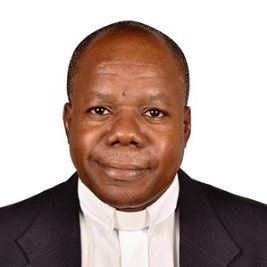
Free services for people living with HIV and AIDSAIDS Healthcare Foundation is providing clinic, pharmacy, counselling and food bank services
Image: Rev Garth Minott, Programme Director, Religious Groups Steering Committee of the Jamaica Council of Churches.
(Kingston, Jamaica) People living with HIV and AIDS are expected this year to have access to free services at the AIDS Healthcare Foundation (AHF) office located on Hagley Park Road in Kingston.
A recent release said the services to be provided by AHF are expected to include clinic, pharmacy, counselling, and a food bank.
The promotion of these services, particularly in communities with a high concentration of people living with HIV and AIDS, is a collaborative effort between the Religious Groups Steering Committee of the Jamaica Council of Churches, which focuses on HIV and AIDS-related matters and the AHF — a not-for-profit, non-governmental organisation with headquarters in Los Angeles, California, USA, the release said.
“The AHF’s mission is to focus attention on the HIV and AIDS epidemic and the right to health, through the provision of cutting-edge medicine and advocacy regardless of ability to pay. The strengthening of the capacity of religious agencies to adequately and appropriately respond to HIV and AIDS issues, is critical, especially in areas with a high concentration of persons living with HIV, most of whom are also of limited economic means,” said Dr Kevin Harvey, AHF Caribbean regional director, is quoted as saying in the release.
In preparation to launch the AHF services, a number of religious leaders from Rockfort to Six Miles, have undergone a sensitisation session on the urgency to continue to focus attention on the context, spread and impact of the HIV-AIDS epidemic, the importance of a healthy lifestyle, awareness of the right to health, together with the importance of adherence to and availability of free anti-retroviral drugs and other medications and services.
“Religious leaders have great influence at the community level through their continuous social intervention programmes, so we hope that with AHF’s guidance and support we will be better equipped to enable persons to activate the right to health and, in the process, advance the mission of promoting positive values and affirming respect for all,” said Rev Garth Minott, programme director, Religious Groups Steering Committee of the Jamaica Council of Churches.
According to the release, HIV/AIDS remains a public health concern and priority for the Ministry of Health and the Government of Jamaica. It is estimated that about 32,000 Jamaicans are living with HIV and as many as 50 percent are unaware of their status. Although the epidemic affects more men than women, over time the number of female victims has been increasing annually, the release said.
WHAT IS PANCAP?
PANCAP is a Caribbean regional partnership of governments, regional civil society organisations, regional institutions and organisations, bilateral and multilateral agencies and contributing donor partners established on 14 February 2001. PANCAP provides a structured and unified approach to the Caribbean’s response to the HIV epidemic, and coordinates the response through the Caribbean Regional Strategic Framework on HIV and AIDS to maximise efficient use of resources and increase impact, mobilise resources and build the capacity of partners.
What are the Global AIDS Strategy 2021–2026 targets and commitments?
If targets and commitments in the strategy are achieved:
- The number of people who newly acquire HIV will decrease from 1.7 million in 2019 to less than 370 000 by 2025
- The number of people dying from AIDS-related illnesses will decrease from 690 000 in 2019 to less than 250 000 in 2025.
- The goal of eliminating new HIV infections among children will see the number of new HIV infections drop from 150,000 in 2019 to less than 22,000 in 2025.
What are the 95-95-95 Targets for ending AIDS?
- 95% of People Living with HIV know their HIV status;
- 95% of people who know their status on treatment; and
- 95% of people on treatment with suppressed viral loads.
HELPFUL LINKS:
Global AIDS Strategy 2021–2026, End Inequalities, End AIDS
https://pancap.org/pancap-documents/global-aids-strategy-2021-2026-end-inequalities-end-aids/
Caribbean Regional Strategic Framework on HIV and AIDS (CRSF) 2019-2025
https://pancap.org/pancap-documents/caribbean-regional-strategic-framework-2019-2025/
